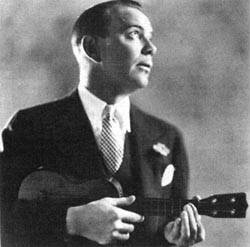Cliff Edwards started in show business when he was a teenager in St. Louis, where he sang in saloons and movie theatres. He began singing in saloons and learned to play the ukulele. This led him to develop a style of improvised singing that he called “effin”. “Effin” sounds like a human voice mimicking a hot trumpet or kazoo solo. Edwards was a great singer with at least three octaves range. He would insert his “effin solos” into his songs the same way a Jazz musician would do a solo. Although Edwards’ 1922 recordings with Bailey’s Lucky Seven and Ladds Black Aces are a good example of scat-singing, some Jazz critics will point to Gene Greene’s 1911 Victor recording “King of the Bungaloos”. Edwards struggled to survive between 1913-19 1918, traveling with carnivals and working menial jobs to make ends meet. He moved to Chicago in 1917 to become a singer at the Arsonia Café, singing for tips and going to tables. He was born in Chicago and began using the stage name “Ukulele Ike”. Bob Carlton, a novelty song writer who was the pianist at the club, played the “Ja Da” song. Cliff was a hit singing the song, and Joe Frisco (a comic and dancer) formed a vaudeville group that was successful enough for them to play at the Palace in New York City. It’s interesting to see that Frisco played a key role in the bringing Tom Brown’s Dixieland Jazz Band from New Orleans to New York in 1915. Edwards and Frisco had their act cut short after appearing in Ziegfeld Follies. Cliff joined forces with Pierce Keegan, a singer and dancer. Their act was called “Pierce Keegan” (Jazz Az Iz) and Cliff Edwards (“Ukelele Ike”) and they toured the vaudeville circuit. They also performed in Zeigfeld’s Midnight Frolic in 1919. Five songs were recorded for Columbia, which unfortunately were never released. Edwards and Lou Clayton, who would work later with Jimmy Durante in vaudeville, broke up the act in mid-1920. Edwards’ first recordings were made in 1922 with Ladds Black Aces, Bailey’s Lucky Seven and the Bailey’s Lucky Seven. Edwards made his Broadway debut in George Gershwin’s “Lady Be Good”, and introduced “Fascinatin’ Rhythm” which was the highlight of the show. He was a star in vaudeville and had other major Broadway successes. The 1920s are remembered by the image of a crooner playing a ukulele. Edwards’ popularity and his uke are the basis for this image. Edwards recorded throughout the 1920s with jazz stars like Red Nichols and Vic Berton. Cliff Edwards’ Hot Combination records are particularly interesting for Jazz. Edwards’ 1929 hit “Singin’ In The Rain” was a big success. This role made him a movie star. Edwards appeared in over 100 motion pictures. Edwards was a sought-after actor in Hollywood throughout the 1930s and 1940s. He was known for his singing and films roles that led to him being cast as Jiminy Cricket, the voice of Pinocchio in the Disney animated film. Cliff sang “When You Wish Upon a Star” from the film, which won him an Oscar for best song in 1940. This song became the Disney corporate theme and is one of the most popular vocal performances of all time. Edwards was the voice of Jim Crow and the star in the Durango Kid westerns. Edwards’ career saw him sell 74 million records. Edwards was a huge success, earning millions of dollars and achieving great success. However, he became bankrupt multiple times due to alimony payments and income tax problems, gambling and alcoholism, and drug addiction. Edwards’ star declined in the 1950s, 1960s, and he died in 1971 on welfare. from http://www.redhotjazz.com
